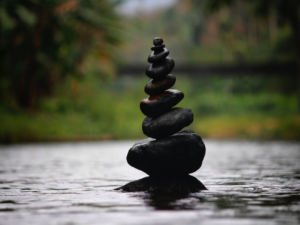
Concept of Total Health in Yoga – Part 1

This article is a highlight of how Yoga can help us in our daily lives and most importantly how simple daily routine techniques can avoid leading to chronic diseases. In today’s world we all know the importance of medicine and the help is providing to many people either to relieve pain, prolong a life, major surgeries and more. However by adopting a few minutes of daily care we can avoid pain, stress and intake of foreign substances, resulting in better management of our total health.
The write up consists of 4 parts. If you are new to Yogic practices and would like to enjoy the benefits I suggest you read each part at a time and take the following steps:
- Enjoy the read;
- Observe your habits;
- See how your habits are effecting your life, can be also in a good way – this is unique for every individual. One person can enjoy an occasional glass of wine, another person can have an increase in acidity for 2 days after enjoying that glass of wine. I guess you got the gist of what I mean!
- Relate to the suggested practices;
- Next, see what you can change;
- Habits, good and bad are not easy to change, so take one step at a time. Give yourself time and do not attempt to change everything in an instant. It is not possible, it’s the road to the feeling of failure;
- Once you got the hang of the first part, then jump to the next one.
- Have fun and DO NOT judge yourself at any time.
1. Living towards total health in today’s world
Components that make for health
Knowing ourselves and the surrounding environment is surely the best way to understand the component of our health. Understanding ourselves, our own values, own motivations and attitudes and resulting style of life will make up good health. As an example, a change in the environment such as a full moon, affects us and so does a change in job, change in country. Right routine, right kind of diet, right habits are the components of ‘Achar’, which make up a healthy lifestyle. Yoga suggests the following 4 pillars being Achar – following the right routine, Ahar – eating the right food, Vichar – the way we think and Vihar – the time we allow for rest and recreation. Keeping the 4 pillars in check can help us become our own doctor and understanding the root of all diseases.
Total health also means looking at it for the long term and treating the individual and not the symptom.
Mental health and indulgence
Lack of awareness is missing and that leads to indulgence. We indulge in food, drinks without realising that it will affect our health and think our bodies can last for a long time. The same applies for mental health, we do things that will affect a disturbance and interferes with the vibrational frequencies.
Awareness in our own behaviour and how we relate to others is key, help keep mental disturbances at bay.
Spiritual health
Being aware of a higher reality is important for the healthiness of the mind and to cultivate a peaceful mind. It is important to develop a witness like attitude. Not to be a judge but to be aware of the words that are coming out from our mouth, our actions and reactions to situations.
Faith is also to be encouraged to have less disturbances and not allowing external factors affect our internal peace. It’s also the way we relate to external situations and how we deal with them. Yoga will help us maintain a healthy spiritual health, stable balanced mind, tranquillity, and most important a greater understanding of ourselves.
It’s all about leading a Yogic lifestyle. Why choose Yoga? – simple, because it follows nature. Hansaji the director of the Yoga Institute in Mumbai, in the Yoga of Caring, suggests to take time to stretch the body, exercise in moderation, eat a plant based diet, take time to meditate and appreciate the nature that surrounds us. The prana (breath) itself is a cure and Yoga has a variety of techniques to help cleanse the body using prana. More to be discussed about the latter in Part 4 of this article.

“Being aware of a higher reality is important for the healthiness of the mind and to cultivate a peaceful mind.”
Exercise – Part 1
Keep a journal and note down the activities you do of a whole week. List down the time of waking up, the food you eat throughout the day and timings, what exercise you do if any. Whatever you do throughout that day needs to be listed down in the journal under the relative column. Below is an example of a typical Monday:
Day of the week
Monday
Achar (routine)
6:30 – Wake up
8 – 5 – Work
6 – 7 – Gym
Ahar (food)
Fruits, rice, salad, lasagna
Vichar (thougts)
Positive thoughts, really feeling good about myself
Vihar (resting)
Play the piano, read a book
- Next step is to understand which habits, routine, food you would like to keep and which you would like to change. Can also include why you would like to change them. Example: I wish to reduce my weight by 10 kgs because I feel heavy and lethargic.
- Right down your objective, in this case losing weight, and try to make a few changes maybe in Achar (routine) or Ahar (food), whichever you think is the most attainable. Maybe only including half an hour rest or 5 minutes meditation.
Remember, a small change at a time can give you a boost in the long term. Will definitely give you the push to do the next change. If you attempt to do all at once, you are preparing a plan for failure.

“The tortoise arrives later than the rabbit but will still reach the destination and lives a long healthy life.”
Personal experience
I was introduced to the 4 Pillars of Yoga by my teachers at Wise Living Yoga Academy during my first Yoga Teacher Training Course. From the first day the 4 Pillars of Yoga are put into practice. I was completely absorbed and deeply grounded. Definitely an AHA! moment for the way Yoga have put simple yet effective practices for the wellbeing of humanity. You might be thinking I was in the right environment without external interferences and having the right guidance. Yes that is a fact, however after leaving the school I had my own plan how to make small changes in my lifestyle with the guidance of the 4 Pillars of Yoga. I kept a journal to note my feelings, thoughts and schedule. That helped me understand which areas require improvement or which practices made me peaceful so as to make more of that.
If there is something you would like to work on in your life, my suggestion is to take small steps, your objective can be reached. If you get discouraged at any point in the journey, remember tomorrow is a completely new day. The path, is a continuous learning experience.
Research
An article based on a research from my 300 Hour Yoga study program at Wise Living Yoga Academy in Chiang Mai Thailand. The main reference book for this article is Yoga of Caring, authors Hansaji and Dr Jayadeva (late), the directors of The Yoga Institute in Mumbai, one of the eldest schools of Yoga. Such practices have been tried and applied by many along the years and are taught at many Yoga schools around the world. As part of my studies I have researched and applied such practices during my Yoga study program.
Reference
Yogendra, Dr J. Yogendra, H. (xxxx). The Yoga of Caring. Mumbai: publisher
To be continued…
